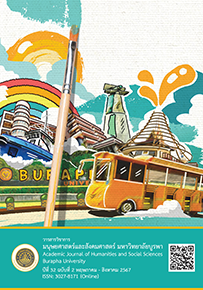Needs and Expectations of Burapha University Undergraduate Students Bangsaen Campus towards the Decision to Choose the Elective Course Japanese Language for Communication
Main Article Content
Abstract
The objectives of this study were 1) to examine and compare the needs and expectations of Burapha University students in choosing the elective course Japanese Language for Communication and 2) to provide a framework for structuring the teaching of Japanese Language for Communication. The study results revealed that Burapha University students were most interested in learning Japanese for communication. Furthermore, their expectations for selecting the elective Japanese language course for communication were also at the highest level. The research comparing the needs and expectations related to the decision to study the Japanese Language for communication found no significant differences in the needs based on gender, age, faculty, desired skills, or expected careers after graduation that led to the decision to study the subject. The expectations of studying Japanese Language for Communication, which led to the decision to study the course, do not differ based on gender, age, faculty, or skills. However, the results show a statistically significant difference when classified by expected career after graduation at the 0.05 level. Therefore, the research hypothesis was accepted. To provide a guideline for organizing the teaching of the Japanese language for communication, the findings suggest that more activities should be conducted during theoretical study so that students have increased opportunities to practice speaking and develop an interest in learning Japanese characters. Therefore, it is important to plan for combining theory and practice in a manner that can be effectively applied in practical situations.
Downloads
Article Details

This work is licensed under a Creative Commons Attribution-NonCommercial-NoDerivatives 4.0 International License.
บทความทุกบทความเป็นลิขสิทธิ์ของวารสารวิชาการมนุษยศาสตร์และสังคมศาสตร์ มหาวิทยาลัยบูรพาเท่านั้น
References
กรมพัฒนาธุรกิจการค้า. (2566). ข้อมูลธุรกิจในพื้นที่การพัฒนาระเบียงเศรษฐกิจพิเศษภาคตะวันออก.
https://www.dbd.go.th/data-storage/attachment/98709588e41ef087bc3b1555.pdf
งามจิต อินทวงศ์. (2556). ความต้องการสวัสดิการของพนักงานมหาวิทยาลัยเทคโนโลยีราชมงคลตะวันออกวิทยาเขตบางพระ จังหวัดชลบุรี. [ปัญหาพิเศษรัฐประศาสนศาสตรมหาบัณฑิต วิทยาลัยการบริหารรัฐกิจ, มหาวิทยาลัยบูรพา].
บวรศรี มณีพงษ์. (2556). การศึกษาความต้องการของนักเรียน ผู้ปกครอง และครูที่มีต่อการจัดการสอนภาษาญี่ปุ่นในสถานศึกษาตำบลสามบัณฑิต อำเภออุทัย จังหวัดพระนครศรีอยุธยา. [รายงานวิจัย]. มหาวิทยาลัยราชภัฏพระนครศรีอยุธยา.
พรรณรัศมิ์ เง่าธรรมสาร, สุธารี ประเสิรฐสรรพ์, จิตราภรณ์ เชิดชูพงษ์, สุกัญญา เถรว่อง และจินตนา สานุพันธ์. (2552). ความต้องการและการจัดการรายวิชาเลือกภาษาอังกฤษของนักศึกษาปริญญาตรีมหาวิทยาลัยสงขลานครินทร์ วิทยาเขตหาดใหญ่. [รายงานวิจัย]. มหาวิทยาลัยสงขลานครินทร์.
ยุพกา ฟูกุชิม่า และริกะ อินะงะขิ. (2562). ความเชื่อ และความคาดหวังของผู้เรียนภาษาญี่ปุ่นชาวไทยต่อชั้นเรียนภาษาญี่ปุ่น ครูภาษาญี่ปุ่น และบทบาทของผู้สอน. วารสารเครือข่ายญี่ปุ่นศึกษา, 9(2), 1-25.
ยุพาภรณ์ พิริยศิลป์. (2557). ความต้องการทางด้านภาษาอังกฤษของอุตสาหกรรมการท่องเที่ยวในเขตจังหวัดขอนแก่น. วารสารการบริการและการท่องเที่ยวไทย, 9(2), 16-30.
สายัณห์ กอเสถียรวงศ์. (2564). ความเชื่อและความคาดหวังของผู้เรียนภาษาญี่ปุ่นชาวไทยต่อการเรียนวิชาการเขียนภาษาญี่ปุ่น. วารสารศิลปศาสตร์ มหาวิทยาลัยรังสิต, 17(1), 35-58.
อริยา คูหา. (2546). แรงจูงใจและอารมณ์. โครงการสนับสนุนการผลิตตำรา คณะศึกษาศาสตร์ มหาวิทยาลัยสงขลานครินทร์ วิทยาเขตปัตตานี.
อรุณทวดี พัฒนิบูลย์. (2559). ความคาดหวังของนักศึกษากลุ่มวิชาภาษาต่างประเทศต่อการจัดการเรียนการสอนในระดับบัณฑิตศึกษา คณะมนุษยศาสตร์ มหาวิทยาลัยรามคำแหง. วารสารรามคำแหง ฉบับมนุษยศาสตร์, 35(2), 63-78.
Herr, E. L., & Cramer, S. H. (1979). Career guidance and counseling through the life span: Systematic approaches. Little, Brown & Company.
Maslow, A. H. (1954). Motivation and personality. Harper & Row, Publishers.
Munby, J. (1978). Communicative syllabus design. Cambridge University Press.


